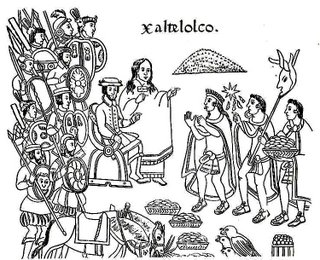Doña Marina, Tiny Bananas, Pineapple Juice & Turkey Tacos
Tuesday, January 20, 2009

Bernal Díaz del Castillo in his Historia Verdadera de la Conquista de La Nueva España mentions the appearance of La Malinche (as Mexicans call her and Doña Marina as Spaniards reverently call her) in April of 1519, when she was among twenty slave women given by the Chontal Maya of Potonchan in the present-day state of Tabasco to the triumphant Spaniards. According to Díaz, Malinche was the noble first-born child of the lord of Paynala near present-day Coatzacoalcos, then a "frontier" region between the Aztec Empire and the Maya states of the Yucatán Peninsula. In her youth, her father died and her mother remarried and bore a son. Now an inconvenient stepchild, the girl was sold or given to Maya slave-traders from Xicalango, a commercial town further south and east along the coast. Díaz claims Malinche's family faked her death by telling the townspeople that a recently deceased child of a slave was Malinche. At some point, she was given or sold again, and was taken to Potonchan, where she was ultimately given to the Spaniards.
Since la Malinche was fairly attractive Cortés gave her to noble born friend Alonzo Hernando Puertocarrero. When Cortés sent Puetocarrero as an emissary to the court of Holy Roman Emperor Charles V (but also Charles I King of Spain) he kept her for himself. Her knowledge of the lingua franca of the region Nahua meant that when she learned Spanish she was able to translate for Cortés.
To this day Mexicans have a complex relationship with a woman they feel sold them out to the Spaniards. There are some, who to the contrary, think that as she was also the lover to Cortés, she was able to somewhat soften the effect of the Spanish conquest. The language and customs survived to the present day. The Aztecs noted such a closeness between La Malinche and Cortés that they called them both by the epithet Malintzin. In the Mexico of today a malinchista is a person who prefers the foreign to the domestic. La Malinche fades into history in 1529 and or 1551, both dates given as her possible death.

When my mother returned from a trip to Mexico in 1953 (we moved to Mexico from Argentina the next year) she told me how there was not a single statue, memorial, street, park named after Hernán Cortés. The exception to the rule was a hotel of somewhat ill-repute (refurbished in the 70s) near the centre of the city called el Hotel Cortés.
The father of one of my favourite Mexican/Spanish writers, Paco Ignacio Taibo II, Paco Ignacio Taibo I tells a story in a lovely CD I bought many years ago in Mexico about leaving Franco's Spain in 1958. Paco senior, like his son, were both of severe leftist tendencies. There was no room for the father and his family in dictatorial Spain. They sailed for Mexico. In a delightful bit of magic realism, Paco Ignacio Taibo I decides to invite a little old lady who also lived forgotten in Spain. The little old lady is Doña Marina as Spaniards reverently call La Malinche. Doña Marina reluctantly accepts but becomes very depressed saying that Mexicans will reject her when they arrive at the port city of Veracruz. She locks herself in her cabin. Taibo I brings her jugo de piña (pineapple juice), plátanos dominicos (finger bananas) and feeds her tacos de guajolote (turkey tacos). When the ship finally arrives and Doña Marina finally emerges from her cabin she is young again and beautifully dressed in white. Taibo I tells Doña Marina, "Let's disembark and enter your land again. Both of us are from conquered people (Taibo’s leftists leanings defeated by Franco), we have that to share." Doña Marina replies, "I will try again."
When they disembark and go through customs they feel the presence of a middle-aged man dressed in a suit of armor. Taibo I and Doña Marina note it is Hernán Cortés. They are surprised to find him alive and in Veracruz since those who know, know hir remains are walled in the church of San Juan de Diós in Mexico city a few meters from the old Cortés Hotel. Cortés looks at the pair and says, "Otro gachupín nos cae encima, “or "Another Spaniard is upon us to bring us tragedy." Cortés turns around and loudly shuffles away in his rusty armor.
To this day I often look at Mexicans in the street, Mexicans in buses, Mexicans at the beach, Mexicans everywhere, and in spite of North Americans from the US and Canada asserting that Mexicans are a happy "fiesta" people I can always discern a look of sadness and tragedy in their faces. I saw this when I was attempting to photograph the lovely Ms Hernandez as an Aztec princess. The more I look at my picture the more I think that the Aztec princess in question is none other than Doña Marina. She is a Doña Marina that, alas, Paco Ignacio Taibo cannot feed turkey tacos, pineapple juice and finger bananas. Taibo I died in Mexico, his adopted land, last year.
It might interest some that the Spanish name for a finger bananas, dominicos also means a Dominican priest or monk. There are those who further add that the size of the little bananas reflects a specific organ of the hated priests who were in charge of the Spanish Inquisition. Furthermore in most Spanish speaking countries a bakery delicacy there is a largish spherical concoction almost identical to a donut hole. Mexicans and Spaniards like to dunk them in thick hot chocolate. Depending on whom you ask this delightful pastry is either called suspiros de monja (a nun's sigh) or bolas de monje (a monk's testicles). And the inhabitants of the Dominican Republic, distancing themselves from any connections to priests and finger bananas, call themselves dominicanos.






